A brokerage is a company that provides financial and investment services to clients. It typically acts as an intermediary between its clients and the financial markets. A brokerage firm may also provide other services such as research, advice, and execution of trades.
What Is a Brokerage Account?
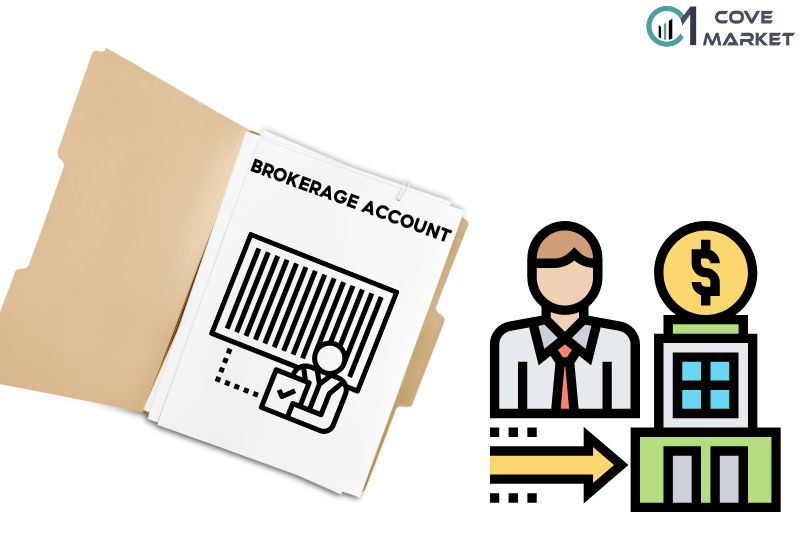
A brokerage account is an investment account that is used to buy and sell securities such as stocks, bonds, mutual funds, and exchange-traded funds (ETFs). A brokerage account can be opened at a variety of licensed brokerage firms, ranging from full-service stockbrokers to low-fee online discount brokers.
What is a brokerage account used for?
Like a bank account, you can transfer money in and out of your brokerage account, but unlike banks, brokerage accounts give you access to the stock market and other investments. Because investment income in a brokerage account is subject to capital gains taxes, brokerage accounts are also referred to as taxable accounts. This is in contrast to retirement accounts (such as IRAs), which have different tax and withdrawal rules and may be better for retirement savings and investing.
“A lot of people think that brokerage accounts are ‘non-tax advantaged,’ but there are tax advantages,” Delyanne Barros, founder of Delyanne The Money Coach, explained.
“The benefit of the brokerage account is leveraging the long-term capital gains tax,” she explained via email. “In order to do that you must be a long- term investor. That means you have to hold your investments for over a year. Not only will this help you capture the most favorable tax bracket, but it will likely result in better returns.”
The long-term capital gains tax rate is 0%, 15%, or 20%, depending on your taxable income and filing status.
What Is a Brokerage Firm?

A brokerage firm or brokerage company acts as a go-between for buyers and sellers of stock shares, bonds, options, and other financial instruments.
Brokers are compensated through commissions or fees charged after the transaction is completed.
Most discount brokerages now offer zero-commission stock trading to their customers. Other sources of revenue compensate for this loss of revenue, including payments from exchanges for large quantities of orders and trading fees for other products such as mutual funds and bonds. The key to reaping the benefits of a brokerage account, according to Barros, is to stay invested, ignore the day-to-day stock market noise, and “go live your life.”
Types of Brokerages
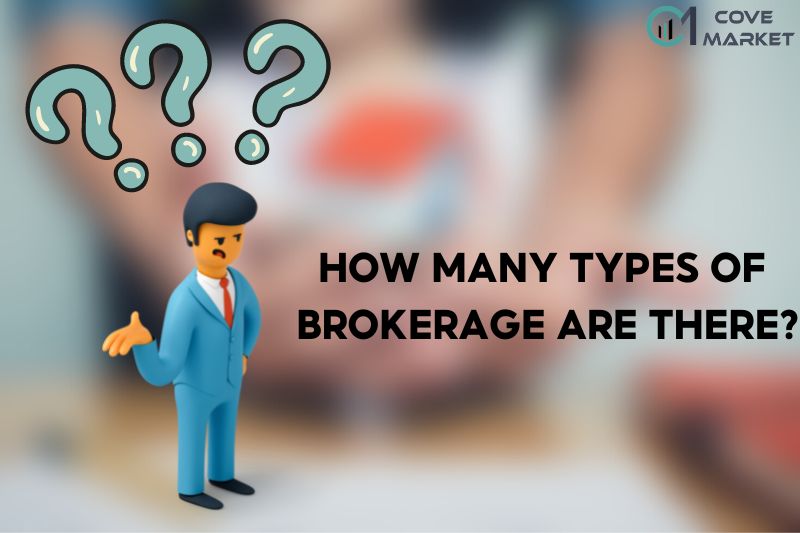
The amount you pay a broker is determined by the level of service you receive, the degree to which the services are personalized, and whether they involve direct contact with humans rather than computer algorithms.
Full-Service Brokerage
Full-service brokerages, also referred to as traditional brokerages, provide a variety of products and services such as money management, estate planning, tax advice, and financial consultation.
These businesses also provide stock quotes, economic research, and market analysis. Professional brokers and financial advisers who are highly trained and credentialed are available to advise their clients on financial matters.
Traditional brokerages either charge a fee or a commission, or both. Full-service brokers may charge up to $20 per trade for regular stock orders. Many businesses, however, are shifting to a wrap-fee business model in which all services, including stock trades, are covered by a single annual fee. The fee ranges between 1% and 3% of the assets under management (AUM).
Many full-service brokers seek out wealthy clients and set minimum account balances that must be met in order to obtain their services, which often start in the six figures or higher.
Some full-service brokerages also provide a low-cost discount brokerage option.
Full-service brokerages include Merrill Lynch Wealth Management, Morgan Stanley, and Edward Jones.
Discount Brokerage
An online brokerage is a discount brokerage. The automated network of the online broker acts as a middleman, processing buy and sell orders entered directly by the investor.
Charles Schwab Corp., which launched its first website in 1995, is widely credited with pioneering the first discount brokerage. Competitors quickly appeared.
Brokerages have evolved over time, adding tiers of services at premium prices. Due to fierce competition on the web and, later, on phone apps, most competitors have reduced their fees for basic stock trading services to zero.
Charles Schwab, along with Fidelity Investments and TD Ameritrade, remains one of the most well-known names in online brokerages.
For mobile brokerage apps, the same names appear, along with newer competitors such as Robinhood and Acorns.
Robo-Advisors
A robo-advisor is an online investment platform that uses algorithms to automatically execute trading strategies on behalf of its clients.
It’s not as crazy as it sounds. Most robo-advisors are set up to follow long-term passive index strategies, though some allow clients to change their investment strategy slightly if they prefer more active management. Some even have human advisors on standby.
Robo-advisers have their advantages, not the least of which are extremely low entry fees and account balance requirements. Most have no annual fee, no commissions, and account minimums of a few dollars.
Access to an advisor is typically charged at a rate of 0.25% to 0.50% of AUM per year. That’s still far less than the cost of a traditional broker.
How Does a Brokerage Account Work?

Many brokers allow you to open a brokerage account quickly and easily online, and you don’t need much money to do so — in fact, many brokerage firms allow you to open an account with no initial deposit. However, before you can buy investments, you must first fund the account. You can do so by transferring funds from your checking or savings account, as well as another brokerage account.
You own the funds and investments in your brokerage account, and you have the option to sell them at any time. The broker manages your account and acts as a go-between for you and the investments you want to buy.
There is no limit to the number of taxable brokerage accounts you can open or the amount of money you can deposit into them each year. A brokerage account should not have any fees associated with it.
Brokerage accounts vs. IRA
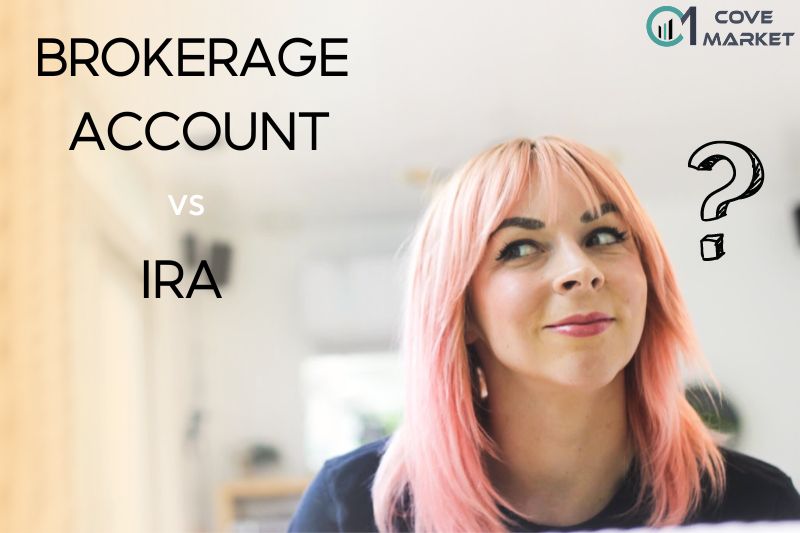
In a standard brokerage account, you contribute after-tax funds, and your investment earnings are usually taxed. On the plus side, brokerage accounts have few rules: you can withdraw your money at any time, for any reason, and invest as much as you want. (Here are our recommendations for the best brokerage accounts.)
A Roth IRA also allows you to contribute after-tax funds, and once you reach the age of 5912 and have held your account for at least five years, you can take distributions, including earnings, without paying additional federal taxes.
“Ideally, you should have both, but the Roth IRA is preferable because it allows you to grow your money tax-free,” said Barros.
Moyers also believes that having both is ideal, but it depends on your goals. An IRA is a good way to save for retirement, but you are tying up your money for a long time, according to her.
“A brokerage account would be more appropriate if you want to save money for a house,” she says.
If you want to save for retirement, you should open a retirement account instead of a taxable brokerage account. (Here are our recommendations for the best IRA accounts.)
You may already be investing for retirement through your employer; many employers offer an employer-sponsored plan, such as a 401(k), and will match your contributions. You can still open an IRA, but Covemarkets.com recommend that you first contribute enough to your 401(k) to earn the match.
The table below provides a quick comparison of brokerage accounts and retirement accounts.
| Brokerage account | Retirement account | |
| Taxes | Investment income may be subject to capital gains tax; investments sold within one year of purchase are subject to ordinary income tax. | Typically, there are no capital gains; growth is tax-deferred or tax-free. |
| Contributions | Unlimited | Caps on annual contributions |
| Withdrawals | No limits or penalties | Penalties for withdrawing before reaching a certain age, unless certain exceptions apply |
| Used primarily for | Stock trading, options trading, additional long-term investments after maxing out retirement accounts | Long-term growth, retirement savings |
Independent vs. Captive Brokerage

Suppose you’re buying or selling financial products like mutual funds or insurance. In that case, you should know whether your broker is affiliated with specific companies and only sells their products or can offer you a full range of options.
You should also inquire whether the broker adheres to the fiduciary or suitability standard. According to the suitability standard, the broker must recommend actions that are appropriate for your personal and financial circumstances. The broker must act in your best interests under the higher fiduciary standard.
Independent
The most common type of independent broker today is a registered investment advisor (RIA).
Independent brokerages have no ties to mutual fund companies. They may be able to recommend and sell better products to the client.
They must adhere to the fiduciary standard, which means they must recommend investments that are most beneficial to the client.
Captive Brokerage
A captive brokerage is a company that is owned or operated by a mutual fund or insurance company and can only sell their products. These brokers are hired to recommend and sell the product line of the mutual or insurance company.
Their recommendations may not be the best option for the client.
How to Choose a Brokerage Account Provider?
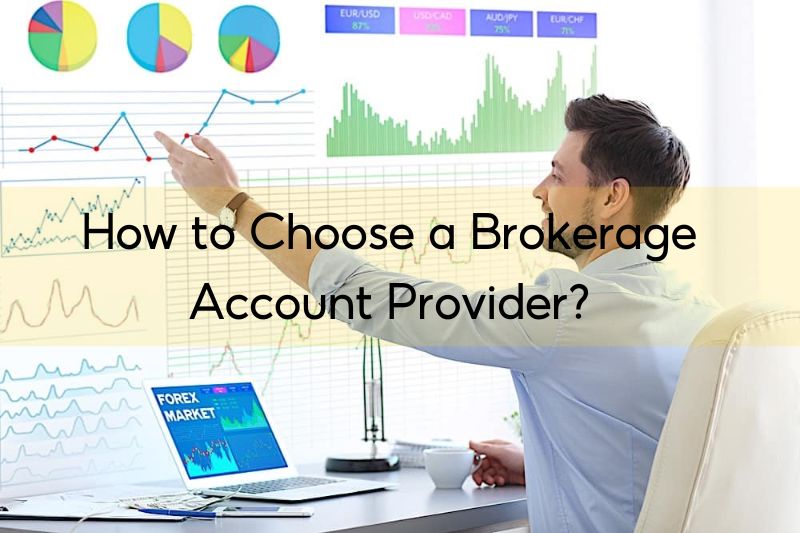
Most investors’ needs are met by two main options: online brokers and robo-advisors. Both provide retirement accounts as well as taxable brokerage accounts.
“You should be cautious about which brokerage firm you open your accounts with,” says Wendy Moyers, a certified financial planner at Chevy Chase Trust in Bethesda, Maryland. “And you should come in with an idea of what you’re going to invest in; you should do some research.”
Account with an online brokerage
If you want to buy and manage your own investments, an online brokerage account is for you.
You can buy and sell investments through the broker’s website if you have an investment account with them. Stocks, mutual funds, and bonds are among the investments available through discount brokers.
Managed brokerage account
A managed brokerage account includes investment management, which can be provided by a human investment advisor or a robo-advisor. A robo-advisor is a low-cost alternative to hiring a human investment manager: these firms use sophisticated computer algorithms to select and manage your investments for you, based on your investment goals and timeline.
If you want to be largely hands-off with your investments, robo-advisors are likely a good fit for you. Covemarkets have compiled a comprehensive list of the best robo-advisers.
Please keep in mind that Cove markets do not recommend investing money that you will need in the next five years. Skip the brokerage or investment account if you’re saving for a short-term goal and instead consider these options for short-term investments.
How to Open a Brokerage Account?
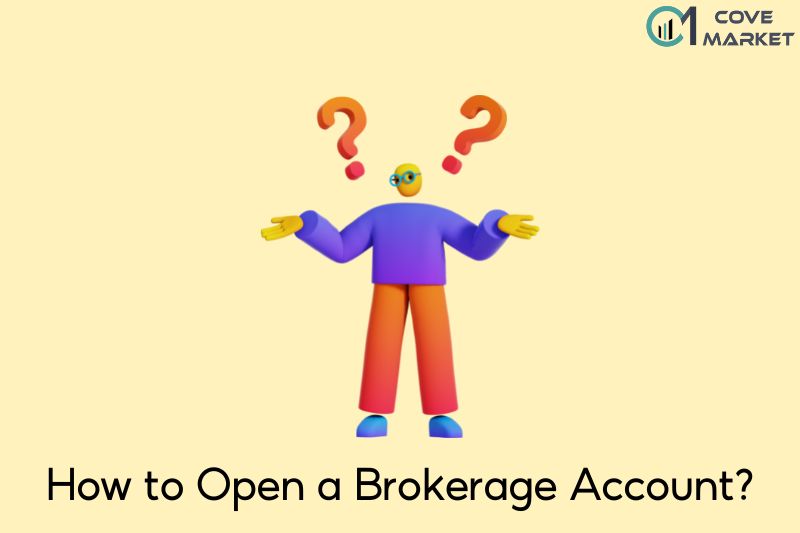
Setting up a brokerage account is a simple process that can usually be completed online in under 15 minutes. (In most states, you must be 18 to open your own account, but parents can open a brokerage account for their children.)
After you’ve opened the investment account, you’ll need to make a deposit or transfer funds. That may sound complicated, but linking your bank account with a brokerage account is a fairly simple process that can be completed online these days.
Some brokers may ask you to confirm a transaction. If that’s the case, you’ll have to wait until the broker deposits a small sum — usually a few cents — into your bank account before you can confirm the transaction by informing the brokerage of the exact amount deposited. If you have any questions, the broker will be happy to answer them. You can begin investing once the transfer is complete and your brokerage account is funded.
You may be asked whether you want a cash or a margin account. A margin account allows you to borrow money from the broker in order to make trades, but you will be charged interest and the account is risky. In general, it’s best to start with a cash account.
FAQs

How Does a Brokerage Firm Work?
A broker is essentially a go-between. Brokers connect buyers and sellers, complete the transaction, and collect a fee for their services.
When you buy stock through an online brokerage, there is no human intermediary between you and the transaction. The match is made by the brokerage software.
The process is similar if you use a full-service brokerage, except that someone else is pressing the keys on the keyboard. However, the full-service brokerage may have identified a good investment opportunity, discussed it with the client, and made the transaction on the client’s behalf.
Is It Worth It to Use a Full-Service Broker?
People who use full-service brokers expect an expert’s advice and attention to guide their financial affairs. These are typically complex, as these clients are typically high-net-worth individuals with complex financial affairs. They are willing and able to pay an average of 1% to 3% of their assets per year for the service.
People who use an online discount broker may feel confident in their ability to manage their own finances and make their own decisions.
How Does a Brokerage Firm Make Money?
Brokerages typically charge fees for each transaction. The online broker who provides free stock trades is compensated for other services as well as exchange fees.
Full-service brokerages are increasingly charging a wrap fee, which is an all-in-one charge for all or most services. This is typically 1% to 3% of the client’s account balance per year and covers advisory services, investment research, and trading fees.
What is the best brokerage account for beginners?
The best brokerage accounts for beginners typically have no account minimums, excellent customer service, and a simple platform. TDAmeritrade, InteractiveBrokers, Fidelity, and Charles Schwab received the highest marks among the brokers reviewed by NerdWallet in our list of the Best Online Brokers for Beginners.
Is there a minimum to open a brokerage account?
Most brokers do not require a minimum account balance to begin trading. If that is a concern for you, look for a broker who does not have one — there are plenty of great options available that do not have a minimum. But keep in mind that an account minimum is not the same as an investment minimum. An account minimum is the amount you must deposit in order to open a brokerage account. An index fund may have a minimum investment requirement, such as $1,000 in shares to participate in the fund.
Should I open an IRA or a brokerage account?
Your situation and investment goals will determine whether you should open an IRA or a taxable brokerage account first. Financial planners frequently advise first and foremost to contribute enough to a company’s 401(k) plan to earn the company’s match, if one is available.
If not, it may make sense to open an IRA before a brokerage account, as IRAs offer significant tax benefits and are designed for long-term growth. If you already have an IRA and are maxing it out, don’t have access to a 401(k) through work, or are already contributing enough to get your company’s match, a brokerage account could be the next step.
Do I pay taxes on a brokerage account?
The mere act of opening a brokerage account does not entitle you to any additional taxes. However, if you buy stock through a brokerage account, you will almost certainly have to pay capital gains tax if you later sell it for a profit. If you sell it within a year of purchasing it, you may be subject to the ordinary income tax rate, which is frequently higher than the long-term capital gains rate.
If you sell an investment at a loss, you can use that loss to offset some of your gains and lower your capital gains tax liability.
If the stock or fund you purchase through a brokerage account pays dividends, you must pay taxes on them even if you reinvest them. If this is the case, your brokerage will send you the straightforward DIV-1099 tax form to include with your tax return.
You won’t have to worry about any of this if you invest through a retirement account.
Can I take money out of my brokerage account?
There are several ways to withdraw funds from your brokerage account. If it is invested in stocks, you must first sell those stocks. Then, once the money is available as cash in your account (which happens almost instantly these days), you’ll probably have to wait a few days before you can withdraw it. Once the trade “settles,” you can withdraw the funds, which may take a few days to appear in your bank account.
So, under normal circumstances, withdrawing funds from your brokerage account should be simple, but keep in mind that it may take several days before the funds are available in your bank account. This process is much faster for brokerages that provide cash management in addition to brokerage services.

